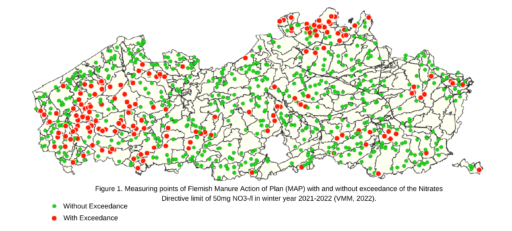In livestock-intensive regions the mineral input and output are not balanced. The crop production systems rely on synthetic fertilisers for fertilisation, whereas livestock production systems face significant costs and problems in waste disposal. Flanders (Belgium), as representative for the Atlantic pilot region, is faced with an unbalanced nutrient use, resulting in the discrepancy between excess load of nutrients from livestock production and the possibility to apply these nutrients in an environmental way on agricultural land. As a result, Flanders is faced with a nutrient paradox where, despite existing nitrogen (N) excess from animal manure, around 70 million kg of N is applied annually on Flemish soil by using synthetic N fertilisers.
At the same time, the EU is aiming for a more sustainable agriculture in which available resources are used effectively by re-connecting crop and livestock production through recycling materials such as on-farm animal manure. In the NutriBudget project, the Atlantic region pilot will assess and implement several agricultural mitigation measures with the aim of optimizing nutrient use by reducing pollution due to the excessive use of nutrients and nutrient losses (eg. nitrate leaching) to the environment. For example, Flanders currently struggles with keeping the quality of its surface and ground waters under the Nitrates Directive stipulated limit of 50 mg NO3–/l (Figure 1). Hence, actions on national level are being put in place to tackle the environmental challenge.
As a part of NutriBudget project, we are currently in the process of selecting and prioritising the mitigation measures that are of interest for the Atlantic region pilot. Updates on this process will follow here soon!
